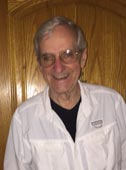Interview with Martin McKneally

Martin McKneally
|
1. What attracted you to come
to Toronto?
Four decades ago,
when I was practicing in Albany,
NY, I began a stimulating collaboration
with the Toronto thoracic
surgical group in clinical
trials of the Lung Cancer Study
Group. Griff Pearson and Bob
Ginsburg were world leaders
in academic thoracic surgery. I
became a student of the Toronto school of thoracic surgery by
correspondence and frequent visits. When I was invited to
join the Toronto faculty in 1990, I was delighted to accept.
2. What sparked your interest in pursuing surgical
ethics?
During the 1960’s, I was appointed as a general
surgery resident at the University of Minnesota to serve on
the transplant committee. We were charged with advising on
decisions about dialysis, kidney donor selection, and other
ethical issues related to those completely new technologies.
Ethical issues in surgery continued to interest me during my
career. When I retired from clinical surgery, surgical ethics
was a logical next chapter to explore, and the Joint Centre
for Bioethics had just appointed Peter Singer as its dynamic
young founding director.
3. You have published many papers – is there a
particular article of which you are most proud?
The Entrustment paper (McKneally MF, Martin DK.
An entrustment model of consent for surgical treatment
of life-threatening illness: Perspective of patients requiring
esophagectomy. JTCVS 2000; 120:264-269). That study
taught me the value of qualitative research and confirmed
the importance of asking for the patients’ perspective. Their
common-sense view of informed consent was quite different
from the one I was learning and teaching as a novice in
bioethics. The opening quotes tell the story: “The surgeon
said, ‘So, it’s your decision.’ I said, ‘I’m going to leave it in
your hands.’ -Esophagectomy patient.”
|
4. You have trained many surgeons – when looking
at your disciples in Thoracic Surgery, who has surprised
you most with their career achievements?
I am
not surprised, but dazzled by the accomplishments of Shaf
Keshavjee who has risen to a world leadership position in
the scientific development of lung transplantation, while
managing an outstanding surgery department, research lab
and building a clinical practice focused on the most complex
thoracic problems.
5. Since 2003 you have interviewed many for the
Spotlight – which stands out most in your memory?
I followed the interview suggestions of my chairs and others
in the department who volunteered ideas. There were so
many stars, it’s hard to choose. One of the most instructive
was interviewing the first orthopedic residents to enter the
Competency Based Curriculum. I learned the positives and
the negatives by hearing the first-hand experience of Jeremy
LaRouche and Sebastian Tomescu (see Surgical Spotlight article 2010).
Their enthusiasm and lessons from the early phase of the
learning curve have helped the program flourish to its present
level, described in this issue by Markku Nousianen’s
recent update (see page 11). A recent fun experience was
reporting David Naylor’s Kergin Lecture (see page 20). I
had the opportunity to learn from his skilled editing of my
draft. He declined my offer to add his name to the byline, so
I left mine off as well.
6. After your distinguished career in Academic
Surgery, do you have any advice for surgeons at the
start of their careers?
Find a problem that stirs your
enthusiasm and creative imagination. Attract and work
with colleagues who are better than you are. Share credit,
income, responsibility, and all the rewards of academic
surgery - the highs and the lows. Put family and friendship
first, and the rest will follow.
7. What are your academic goals in Boston?
I’d like to
establish a formal program that will help surgeons become
scholars in Surgical Ethics.
Mark Camp, Assistant Professor,
Division of Orthopaedic Surgery,
University of Toronto |